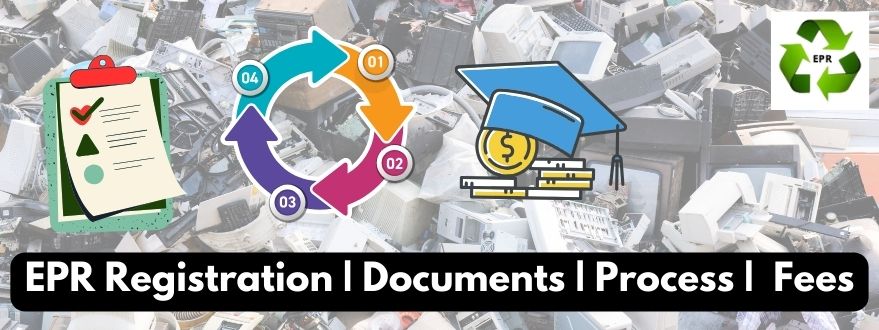
The Extended Producer Responsibility (EPR) concept has gained significant attention in recent years due to growing environmental concerns and the need for sustainable waste management.
EPR Registration in India is a vital step for producers and importers to take responsibility for the environmental impact of their products.
In this blog, we will explore the EPR Registration process, the required documents, and associated fees to help you understand this crucial environmental compliance framework.
|
Table of Contents: |
Extended Producer Responsibility (EPR) Registration in India is a crucial process mandated for manufacturers, importers and producers of certain waste-producing products.
It focuses on E-waste, P-waste and battery waste and is aimed at making manufacturers and importers take responsibility for the lifecycle of their products, including recycling and disposal.
This registration is guided by the E-Waste (Management & Handling) Rules, 2011, which came into place on 1st May 2012. The rules describe the duties of producers in managing e-waste and have specific targets for waste collection.
EPR registration focuses on the environmental and economical approach of recycling waste, thereby significantly reducing the negative impact on the ecosystem. It involves proper disposal and recycling guidelines set by the Central Pollution Control Board (CPCB).
EPR registration in India covers a range of waste categories, each requiring distinct compliance measures. The primary categories of EPR registration include:
This category focuses on electronic waste, including products like computers, mobile phones, and electronic components. Manufacturers and importers of electronic goods must adhere to EPR regulations to manage the disposal and recycling of e-waste responsibly.
EPR for plastic waste involves the responsible handling of plastic products, packaging, and materials. Producers and importers of plastic items are mandated to implement effective waste management plans.
Battery waste falls under a separate category, requiring manufacturers and importers to manage the end-of-life disposal of batteries efficiently. This ensures the safe recycling and disposal of batteries, minimizing environmental impact.
Yes, EPR registration is mandatory for producers and importers that produce or import specific products falling under the purview of EPR regulations.
The obligation to register is clearly outlined in the E-Waste (Management) Rules, 2016, and the Plastic Waste Management Rules, 2016.
These regulations have been put in place to ensure responsible waste management and reduce the environmental impact of certain products.
Compliance with EPR regulations is essential to minimize environmental degradation and promote sustainable waste management practices.
To initiate the EPR registration process, the following documents are required:
Here are the following steps for EPR Registration Process:
Step 1: Check the specific waste streams and products governed by EPR rules, such as those outlined in the E-Waste (Management) Rules, 2016, and the Plastic Waste Management Rules, 2016.
Step 2: If it qualifies for EPR, select an approved Producer Responsibility Organization (PRO) to oversee and manage your EPR plan. Ensure the chosen PRO aligns with your waste management objectives.
Step 3: Gather all the necessary documentation for your EPR registration, which typically includes:
Step 4: Submit your application with documents to the relevant regulatory authority, which varies based on your location and the specific waste stream your business handles, such as the Central Pollution Control Board (CPCB), State Pollution Control Board (SPCB), or Pollution Control Committee (PCC).
Step 5: The regulatory authority will review your application and documents, potentially conducting on-site inspections to verify compliance with EPR regulations.
Step 6: After a successful review and approval process, you will receive the EPR Certificate.
Click here to check the sample copy of the EPR Registration Certificate.
The EPR Registration fees can vary depending on factors like the waste stream and your location.
These fees are designed to cover administrative expenses related to the registration process.
As per the Government guidelines, here is the general fee structure:
| Waste Generated in TPA | Cost off EPR Application(Govt) |
|---|---|
| Less than 1000 | 10000 |
| Between 1000-10000 | 20000 |
| More than 10000 | 50000 |
In conclusion, the EPR certificate is a critical requirement in fulfilling environmental responsibilities for producers and importers in India.
However, navigating the process of EPR certification can be a daunting task, especially for companies seeking a seamless and efficient process.
This is where the invaluable assistance and support of the EPR Registration consultant, Brand Liaison, come into play.
With our expertise and dedication, we guide producers and importers through every step of the EPR certification journey, ensuring a swift and hassle-free experience.
Please click here to view our tutorial on obtaining the EPR Registration Certificate.